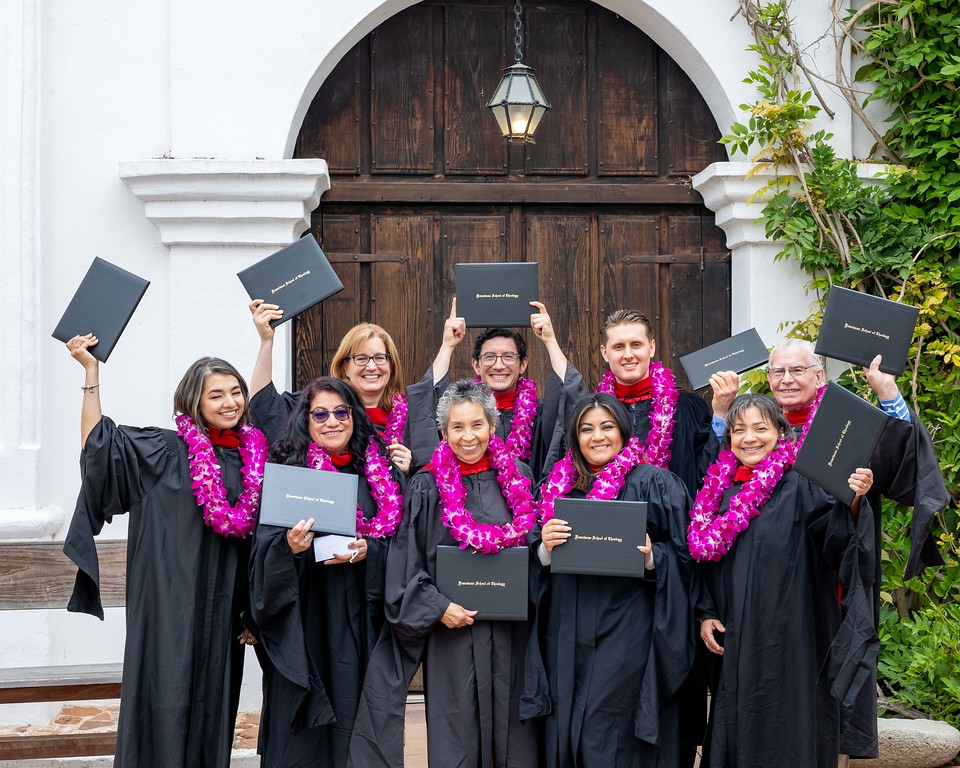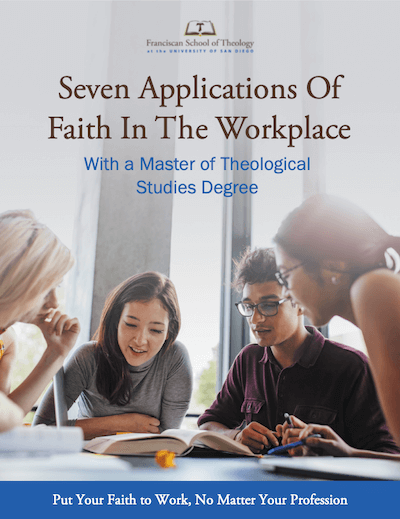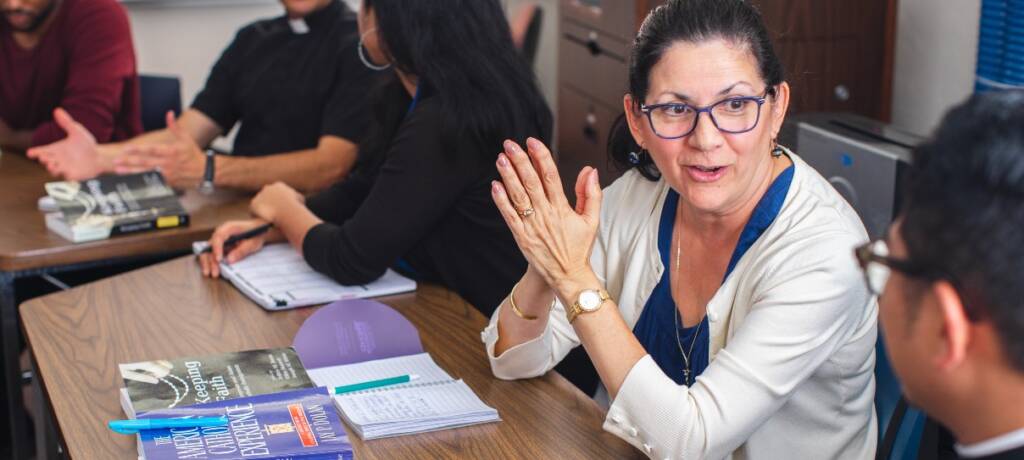Among countless academic pursuits, one field of study stands out as a profound, multidisciplinary exploration of the human condition. Theology, the academic study of religion, offers a unique blend of philosophy, history, anthropology, language, and more — but is earning a Master of Theological Studies worth it?
There are a wide variety of pursuits, both personal and professional, for which a theological education is ideal preparation. When it comes to worth, it all depends on what you value as the ultimate goal.
The Role of Theology Within Faith
Theologians — those who study theology — delve deep into the core of faith, addressing the philosophical, ethical, and metaphysical questions that have been ever-present in human existence. These academics assume the monumental task of contemplating and debating the very nature of the Divine, often through the lens of a specific denomination or charism (though not always).
Earning a Master of Theological Studies degree (MTS), however, is much more than the study of holy texts like the Bible or the Quran. An MTS program facilitates the systematic examination of traditions, observations, and concepts that underpin the divine and religious truths within a particular faith. By studying theology, we learn more about the world that a certain faith creates or the unique ways that faith guides us.
Theology isn’t confined to the spiritual realm alone — as a truly multidisciplinary field of study, it analyzes the culture present at the time scripture was written, inviting critical questions about its relevance in today’s global understanding. The study of theology is part philosophy, part history, part anthropology, and something entirely its own, offering a fascinating perspective on the interplay between religion and human existence.
What makes theological studies even more compelling is that you don’t need to be religious to have a genuine interest in religion. The richness of this discipline extends beyond one’s personal beliefs, making it an intellectually stimulating and multifaceted field of study.
Whether you’re a devout believer seeking a deeper understanding of your faith or simply curious about the intricacies of human spirituality, pursuing an MTS degree may present the ideal transformative experience.
6 Reasons an MTS Degree Is Worth It
The study of theology is not for the faint of heart; unlike science or engineering, it is possible for every theological question to have an infinite number of answers. Serious students embark on a deep and unrelenting exploration of the intricacies of faith, doctrine, and the very essence of humans’ spiritual existence.
Here are six reasons why entering an MTS program is well worth the challenges it presents:
1. Build a strong faith foundation.
At the heart of every faith lies its doctrine — the foundational building block that provides support and direction. Theologians acknowledge the sacredness of doctrine and do not attempt to water it down or simplify it for easier consumption. Instead, they explore the profound complexities of belief with genuine curiosity, recognizing that true faith cannot be reduced to mere platitudes. This, in turn, helps strengthen one’s own connection to their faith.
“We’ve got to be able to express the depths of what we believe…in a language people can understand. That’s the challenge today. And to do it, to express it in continuity with what’s been given to us, takes real, academic, hard work. You have to know the tradition in such a way that you can speak about it in a new way. You have to know history in such a way that the good and evil that is always present — the perfection and imperfection that people experience — doesn’t throw people off-kilter, doesn’t get them confused, because we have a center to our life of faith. To do it, we have to work hard. We can’t accept a “bullet point” faith. We can’t accept a faith made up of pastiche, of unified and competing ideas.”
Fr. Joe Chinnici, OFM, Ph.D.
Franciscan School of Theology
2. Practice embracing contradictions.
Theology is not about providing easy answers; it’s about asking difficult questions. It encourages you to wrestle with apparent (and sometimes baffling) contradictions, pursuing a deeper understanding of God, faith, doctrine, tradition, culture, morality, and more. By confronting these paradoxes head-on, you gain invaluable insights into the very essence of your own beliefs as well as others’.
3. Unearth uncomfortable truths.
The study of theology does not gloss over the uncomfortable facets of history or unsettling truths about the past, present, and future of religion. It challenges preconceptions and forces students to confront the less-than-perfect aspects of their faith. This can be a real challenge for many who enter the field seeking validation of their beliefs — but truly committed and curious scholars learn to push through the discomfort and destabilization in the pursuit of a broader understanding of faith.
4. Discover you are capable of rising to the challenge.
While the study of theology can be intellectually demanding, it’s important to remember that when we believe something holds real import or has a genuine effect on our lives, we rise to the challenge. The pursuit of theological knowledge, though challenging, can be incredibly rewarding.
5. Find comfort and purpose.
A deep understanding of theology can be a source of comfort during times of tragedy, a pillar of support during moments of doubt, and a wellspring of purpose in your life. It provides substance to your work, offering a sense of fulfillment and direction.
6. Enrich your worldview.
Studying theology exposes you to a wide range of viewpoints on a multitude of subjects, all at the same time, which will likely inform the way you live the rest of your life. You will begin to see the world differently, sense it differently, and relate to others in a deeper and more meaningful way.
For many, the pursuit of a Master of Theological Studies degree can be a transformative journey, one that goes far beyond the academic or traditional. It challenges you, deepens your faith, and enriches your perspective on the world. You may find that the rewards extend well beyond the classroom, shaping your beliefs and your life in unexpected ways.
Hear Fr. Joe Chinnici, OFM, Ph.D., speak about knowing your faith in the “Office Hours” series from the Fanciscan School of Theology:
What You Will Learn in an MTS Program
In graduate-level theological studies, there is a strong emphasis on intellectual discussions, debates, and academic presentations of students’ findings and conclusions, often in the form of a capstone or thesis. Students frequently engage in thought-provoking dialogues as well as independent contemplation and study.
While each theological studies program will have a unique course load, an MTS curriculum typically covers the same fundamental subjects. Core topics of study include:
- History of religion: History provides context for today’s manifestations of faith and faith traditions. Students examine how God appears throughout human history and how we can bridge the gap between ancient religious traditions and contemporary society.
- Scripture and doctrine: Theological programs are often guided by one presiding faith or denomination, so in-depth study of the relevant scriptures and religious doctrine is a key component of the course load. This also includes ecclesiology, or the study of church structure, including leadership, hierarchy, sacraments, expectations for followers, and even the physical manifestation of a place of worship.
- Theological authors and thinkers: Students study the works of significant authors and theologians who have left their mark on theological discourse. Engaging with their writings provides insight into the evolution of theological thought over time and introduces new ways of thinking about religion.
- Enduring faith concepts and questions: Theology tackles the “big questions” head-on. Students explore topics including vocational discernment, atonement, virtue, morality, and more, contemplating their significance and relevance in contemporary life.
- Integrated faith studies: Theology does not exist in isolation; it’s intricately connected to various other fields. An MTS program will encourage students to consider how faith integrates and interacts with disciplines such as philosophy, ethics, science, politics, psychology, education, and more. This interdisciplinary approach broadens students’ perspective and fosters a more comprehensive understanding of faith’s role in the world.
Along with studying the standard academic aspects of theology in an MTS program, you will continuously reflect on your beliefs, the beliefs of others, and their real-world implications. This introspective approach fosters both personal and intellectual growth.
Ultimately, being a good theologian means becoming a better, more well-rounded person. You will learn to recognize and understand how God is encountered not just in religious contexts, but in people, relationships, the natural world, and all aspects of human life. This holistic perspective enriches your theological insight and your overall worldview.
“Theology needs to partner with another discipline in order to have power, impact, and employability. The theology degree is most powerful when combined with a catalytic compound such as education, management, or clinical/therapeutic skills. Theology provides meaning and understanding. It is most powerful when partnered with a practical application.”
Bill Coy, MTS
Franciscan School of Theology, 1982
Possible Career Paths with an MTS Degree
A theological education is not only meant to prepare you to serve in a pastoral or clerical capacity; it also provides the ideal foundation for support roles such as church administrator, sacred music director, or catechist. Note that, if you wish to formally enter the clergy, you will likely need to earn a Master of Divinity degree.
Many people with a Master of Theological Studies also go on to work in education, service professions, the military, and even the legal system.
Common occupations related to faith include:
- Religious studies teacher
- University lecturer
- Chaplain
- Campus minister
- Lay minister
- Faith counselor
- Religious archivist
Other common service-related professions include:
- Non-profit professional
- Youth services worker
- Bereavement counselor
- Social worker
An MTS also helps build skills of analysis, oral and written communication, problem solving, research, and cultural awareness, all of which can support you in a number of careers, such as:
- Politics
- Journalism
- Law
- Diplomacy and international relations
- Civil service
- Healthcare
For more details on possible careers with a theology degree, college admissions counselors can provide you with contact information of alumni who would be willing to share their academic and post-graduate experiences.
Tips for Studying Theology
The journey through a theological studies program is unique to the individual. Your path will be shaped by your personal criteria, your values, your beliefs, and your goals. When entering an MTS program, take a moment to consider what motivates you to study religion and how it will relate to your core values and beliefs.
“Don’t study theology to advance yourself. Don’t do it just because you can get a job or a ministry placement out of it. That’s an important consideration — but I think what’s really going to get you through the times when the exams are coming, when you have that paper to write, when you’re feeling the crunch and you’re thinking, ‘Why did I ever get into this program?’ — that’s when you realize you’re doing it for the love of learning. That there’s something beautiful about learning itself. Whether it results in a big paycheck or not, it is a worthwhile thing to do because you grow in wisdom.”
Br. Bill Short, OFM, STL, STD
Franciscan School of Theology
Studying theology goes beyond just understanding God and religion; it also seeks to understand humanity. Theology prompts us to contemplate how faith evolves over time. It compels us to reflect on how faith communities can respect and embrace culture, language, geography, and societies while maintaining a sense of unity.
A critical aspect of studying theology is acknowledging that scriptures come from a specific time and place in history. Theologians must grapple with the stark differences between past cultures and today’s modern society. This calls for a rigorous examination of systemic issues like racism, patriarchy, and colonialism that may challenge our understanding of history and theology.
More importantly, theology provides a unique platform from which to understand and relate to those who have been marginalized throughout history. It offers an opportunity to learn how to avoid perpetuating the marginalization of individuals or communities, and how we can work toward improvement by drawing vital lessons from the past.
“It’s very important that theology has a capacity for self-criticism, for honesty. [To] be honest about where you’re coming from, doing the theological equivalent of checking your privilege is, it seems to me, a deeply gospel-based thing.”
Rowan Williams, 104th Archbishop of Canterbury
Master of Magdalene College, Cambridge University
As you embark on your theological studies, always be asking questions. An eagerness to learn is at the core of theology and serves as an expression of your belief, especially when it comes to understanding the meaning, intent, and application of scripture. Embrace the opportunity to delve into rigorous theological inquiry, constantly seeking to expand your knowledge and wisdom.
While theological studies often involve solitary research and contemplation, it’s equally important to engage with your community. Surround yourself with like-minded individuals who share your passion for theology. Having a few trusted companions with whom you can think out loud, ask questions, and pray through your discoveries and challenges together can be an invaluable source of support and guidance on your theological journey.
By considering your personal criteria, acknowledging the complexities of history, and actively engaging with your community, you’ll be better equipped to navigate the intricate landscape of theological studies and contribute meaningfully to the discourse on theology and its impact on our world.
“I started learning things, discovering things, and being told things I never dreamed. It wasn’t like a theory to prove. It wasn’t something statistically plausible to analyze. It was simply reflections and faith from different aspects.”
Michael Brown, MTS
Franciscan School of Theology, 2017
Master of Theological Studies in Franciscan Theology
There are many paths to choose from when considering studying theology. If you are considering a Master of Theological Studies degree and are drawn to a theology that marries faith with action and contemplation, a Franciscan theology program might be the perfect fit. An MTS in Franciscan Theology stands out for its unique and open-minded approach, one deeply rooted in the teachings of Saint Francis and Saint Clare of Assisi.
At the heart of Franciscan theology is the fundamental belief in John 4:16: “God is love.” This simple yet profound statement serves as the guiding principle for both students and instructors, encouraging them not just to learn about theology, but to live it.
Just like the perpetual conversion inherent in Franciscan Catholicism, the journey through this type of program is transformative, moving from conversion to action and contemplation. This transformation is centered on a profound concept: the understanding of the human person in the world, and a deep focus on the humanity of Jesus Christ.
What truly sets Franciscan theology apart is its departure from the conventional notion of monastic meditation, prayer, and contemplation. Instead of isolating oneself from the world, Franciscanism advocates for active participation in the world. It urges individuals to become mediators of God’s presence and goodness in their everyday lives, making the divine manifest in the ordinary.
It’s important to note that there are different Franciscan theological traditions, each with its own unique approach. However, they are all united by a common thread: the refusal to separate theory from practice. In Franciscan theology, life is the place where God is to be recognized, experienced, named, and loved. It’s a philosophy that emphasizes that the world is not just a collection of things, but rather a tapestry where everything manifests the truth that God is good.
In essence, Franciscans, both consecrated and lay individuals, are encouraged not only to learn theology but to actively “do theology.” This means living out the theological principles they learn, making their faith tangible through actions that reflect God’s love and goodness in the world.
Earning an MTS in Franciscan theology is an opportunity to not only deepen your understanding of theology but also to transform your life by living out the teachings of Saint Francis and Saint Clare, where love and goodness are at the core of everything you do.
“There are all these Catholic scientists whose writing would just floor me. I was just taking everything in. I loved that it was flipping my world upside down. I loved learning about it from a different angle. So FST was very important to me as far as just opening my mind and learning how to dialogue with people. Seeing God in all things was powerful and still a continued practice.”
Nicole Carrubba, MTS
Franciscan School of Theology, 2017
In a Master of Theological Studies program, you will not only gain knowledge but also experience remarkable growth as you explore the complexities of faith, engage in intellectual discourse, and discover how theology shapes your understanding of the world and your place in it. It’s an educational journey that extends far beyond the classroom, enriching your life in ways you may not have previously imagined and making it well worth your time and effort.
To learn more about the all-online Master of Theological Studies – Franciscan Theology from the University of San Diego, please visit the degree page or contact an enrollment advisor for more information.




